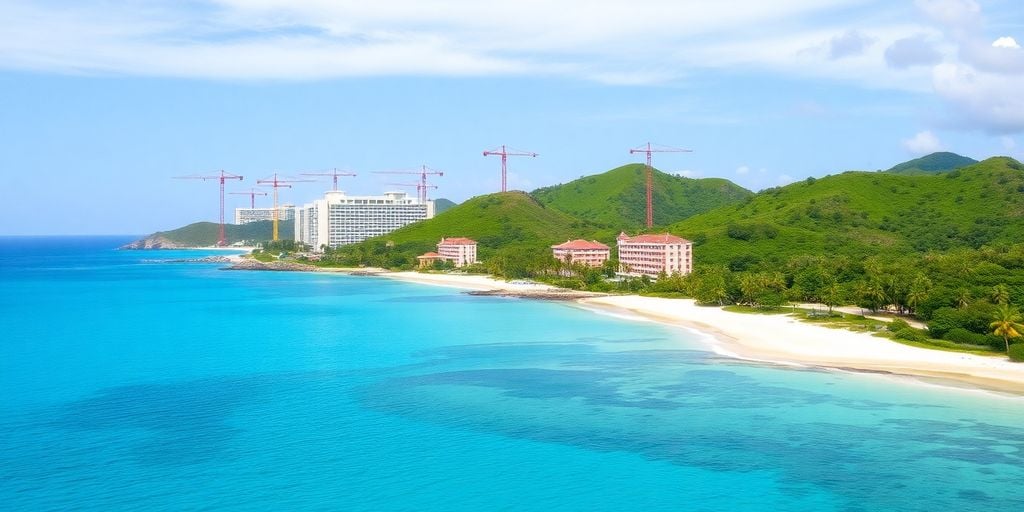Kushner’s Albanian Ambition: Luxury Resorts Spark Environmental Outcry
Jared Kushner’s proposed multi-billion-dollar real estate ventures in Albania, including a luxury resort on the uninhabited Sazan Island and another in the Vjosa Narta Protected Landscape, are drawing significant criticism. Environmentalists and local communities are raising alarms over the potential destruction of vital ecosystems, including critical bird habitats and sea turtle nesting grounds, while critics also point to concerns about land ownership and political influence.
Key Takeaways
- Jared Kushner’s plans involve developing a luxury resort on Sazan Island, a former Cold War military base, and another in the ecologically sensitive Vjosa Narta Protected Landscape.
- Environmental groups warn these developments threaten endangered species like the Dalmatian pelican and loggerhead sea turtles, and could disrupt crucial bird migration routes.
- The Albanian government recently passed a law permitting luxury hotels on protected land, which critics allege was specifically designed to facilitate the Kushner-Trump development.
- Local residents express fears of land displacement and question the transparency of the deals.
- While some see the projects as an economic boon for Albania, others advocate for more sustainable tourism models that benefit a broader segment of the population.
Environmental Concerns Mount
The proposed developments, particularly the resort in the Vjosa Narta Protected Landscape, are facing fierce opposition from environmentalists. This area is a critical breeding and feeding ground for numerous bird species, including endangered Dalmatian pelicans, pink flamingos, ospreys, and spoonbills. It also serves as a vital stop on the Adriatic migration route for birds heading to North Africa. Conservationists, like Xhemal Xherri of the Protected and Preservation of Natural Environment in Albania (PPNEA), are actively monitoring the 220 bird species in the region and have filed lawsuits to halt construction, including that of the Vlore International Airport, which is also within the protected area.
Beyond birds, the plans threaten sand dunes essential for loggerhead sea turtle breeding and nesting. Environmentalists fear the extensive infrastructure required for such resorts, including roads and water supply, will cause irreversible damage to these fragile ecosystems.
Economic Hopes Versus Ecological Risks
Albania, one of Europe’s poorest countries, has seen a surge in tourism, with Prime Minister Edi Rama aiming to transform it into a major tourist destination. Many Albanians view these large-scale developments as crucial for economic growth and poverty reduction. However, critics argue that exclusive luxury resorts primarily benefit a select few, rather than fostering broad-based economic improvement.
- Economic Arguments for Development:
- Potential for significant foreign investment.
- Job creation in construction and hospitality sectors.
- Increased tourism revenue for the country.
- Environmental and Social Arguments Against Development:
- Irreversible damage to biodiversity and natural habitats.
- Displacement of local communities and land ownership disputes.
- Concerns about political influence and lack of transparency in deal-making.
- Preference for sustainable tourism models that preserve natural assets.
Political Scrutiny and Land Disputes
The Albanian government’s recent legislative changes, allowing luxury hotels on previously protected land, have fueled suspicions of special treatment for the Kushner-Trump projects. Opposition leader Agron Shehaj has characterized the situation as a "private deal" by Prime Minister Rama, using national assets to gain political support from the United States. Both Rama and Kushner deny any impropriety.
Adding to the controversy are land ownership issues in adjacent villages like Zvernec, where residents fear their traditional lands will be seized through fraudulent means. Many villagers, lacking formal deeds, express deep distrust in the government’s handling of these developments, fearing the loss of their heritage and the destruction of their natural surroundings.






